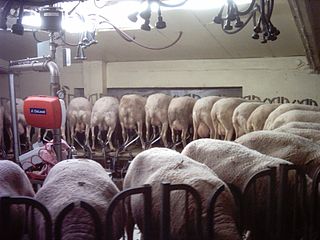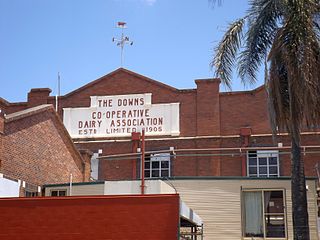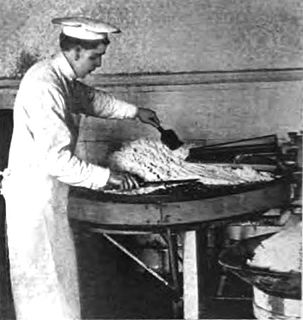
Fonterra Co-operative Group Limited is a New Zealand multinational dairy co-operative owned by around 10,500 New Zealand farmers. The company is responsible for approximately 30% of the world's dairy exports and with revenue exceeding NZ$17.2 billion, is New Zealand's largest company.

Northern Rivers is the most north-easterly region of the Australian state of New South Wales, located between 590 kilometres (370 mi) and 820 kilometres (510 mi) north of the state capital, Sydney, and encompasses the catchments and fertile valleys of the Clarence, Richmond and Tweed rivers. It extends from Tweed Heads in the north to the southern extent of the Clarence river catchment which lies between Grafton and Coffs Harbour, and includes the main towns of Tweed Heads, Byron Bay, Ballina, Kyogle, Lismore, Casino and Grafton. At its most northern point, the region is 102 kilometres (63 mi) south south–east of the Queensland capital, Brisbane.

Sheep's milk is the milk of domestic sheep. It is commonly used to make cultured dairy products such as cheese. Some of the most popular sheep cheeses include feta (Greece), ricotta (Italy), and Roquefort (France).

Otto Frederick Hunziker was a pioneer in the American and international dairy industry, as both an educator and a technical innovator. Hunziker was born and raised in Switzerland, emigrated to the U.S., and studied at Cornell University. He started and developed the dairy program at Purdue University when such programs were at their infancy. At this same time, Hunziker was heavily involved with the development of the American Dairy Science Association (ADSA) and the standardization and improvement of many dairy tests and processes. Hunziker wrote several of the leading dairy processing texts, which continue to be cited. After leaving Purdue University, Hunziker managed research and operations at a large, national condensary, continued to drive ADSA's standardization and publishing efforts, represented the U.S. at international dairy congresses, and facilitated dairy industry improvements across the globe.

Fish and Game New Zealand is the collective brand name of 12 regional Fish and Game Councils and the New Zealand Fish and Game Council which administer sports fishing and gamebird resources in New Zealand. Fish and Game Councils are regionally autonomous bodies, which are governed by elected Fish and Game councillors, who are elected every three years by adult full season license-holders across the respective region. The New Zealand Fish and Game Council is made up of one representative from each of the regional councils. Councils employ managers and staff, and the New Zealand Fish and Game Council employs a director; the role is currently held by Bryce Johnson.

The National Dairy Research Institute (NDRI), Karnal is India's premier institute for dairy research. The institute was accorded the status of Deemed University in the year 1989.

The National Dairy Shrine is an American dairying group founded in 1949 and based in Wisconsin. The shrine promotes the dairy industry and records its history. As of 2007, the organization had over 18,000 members from most facets of dairying. It holds an annual ceremony where it inducts members of the dairy industry into its hall of fame.
In New Zealand "dirty dairying" refers to damage to the ecological health of New Zealand's freshwater environment by the intensification of dairy farming, and also to the high profile campaign begun in 2002 by the Fish and Game Council to highlight and combat this.

In New Zealand, agriculture is the largest sector of the tradable economy, contributing about two-thirds of exported goods in 2006–7. For the year ended March 2002, agricultural exports were valued at over $14.8 billion. New Zealand is unique in being the only developed country to be totally exposed to the international markets since subsidies, tax concessions and price supports for the agricultural sector were removed in the 1980s. However, as of 2017, the New Zealand Government still provides state investment in infrastructure which supports agriculture.

Water pollution in New Zealand is an increasing concern for those who use and care for waterways and for New Zealand regulatory bodies. An increase in population is linked to an increase in water pollution, due to a range of causes such as rural land use, industrial use and urban development. Fresh water quality is under pressure from agriculture, hydropower, urban development, pest invasions and climate change. While pollution from point sources has been reduced, diffuse pollution such as nutrients, pathogens and sediments development and from stormwater in towns is not under control. There are more than 800 water quality monitoring sites around New Zealand that are regularly sampled.

Water pollution in Canterbury in New Zealand has become a notable environmental issue due in a large part to the burgeoning dairy industry.

The Downs Co-operative Dairy Association Limited Factory is a heritage-listed factory at 57 Brook Street, North Toowoomba, Toowoomba, Toowoomba Region, Queensland, Australia. It is also known as Dairy Farmers Factory. It was added to the Queensland Heritage Register on 18 April 2008.

Dairy salt is a salt product used in the preparation of butter and cheese products that serves to add flavor and act as a food preservative. Dairy salt can vary in terms of quality and purity, with purer varieties being the most desirable for use in foods. Dairy salt has been used since at least the 1890s in England and the United States. In butter preparation, it serves to retain moisture, while in cheeses, it tends to reduce water content and slow the ripening process.
Water quality in Taranaki is a notable environmental issue for many stakeholders with concerns about the potential impact from dairy farming in New Zealand and petrochemical industries.
Dara Nusserwanji Khurody was an Indian entrepreneur known for his contributions to the dairy industry of India. He worked in various private and government organization at the start of his career and also held government official positions later on. He was the Milk Commissioner of Bombay from 1946 to 1952. His name was considered "synonymous with dairying" in India in the 1950s. He received the Ramon Magsaysay Award jointly with Verghese Kurien and Tribhuvandas Kishibhai Patel in 1963 and the Padma Bhushan from the Government of India in 1964.

Dora Glover Saker was an instructor in cheese-making for Somerset County Council. The rediscovery of her book, Practical Cheddar Cheese-making (1917), by cheese-makers in the twenty-first century has been credited with inspiring a revival of interest in historic cheese-making methods and to have "quickly acquired cult status amongst farmhouse cheese-makers".
George Sutherland Thomson FRSE FCS (1871–1958) was a 20th century Scottish biochemist and scientific author, and an expert in the dairy industry.













